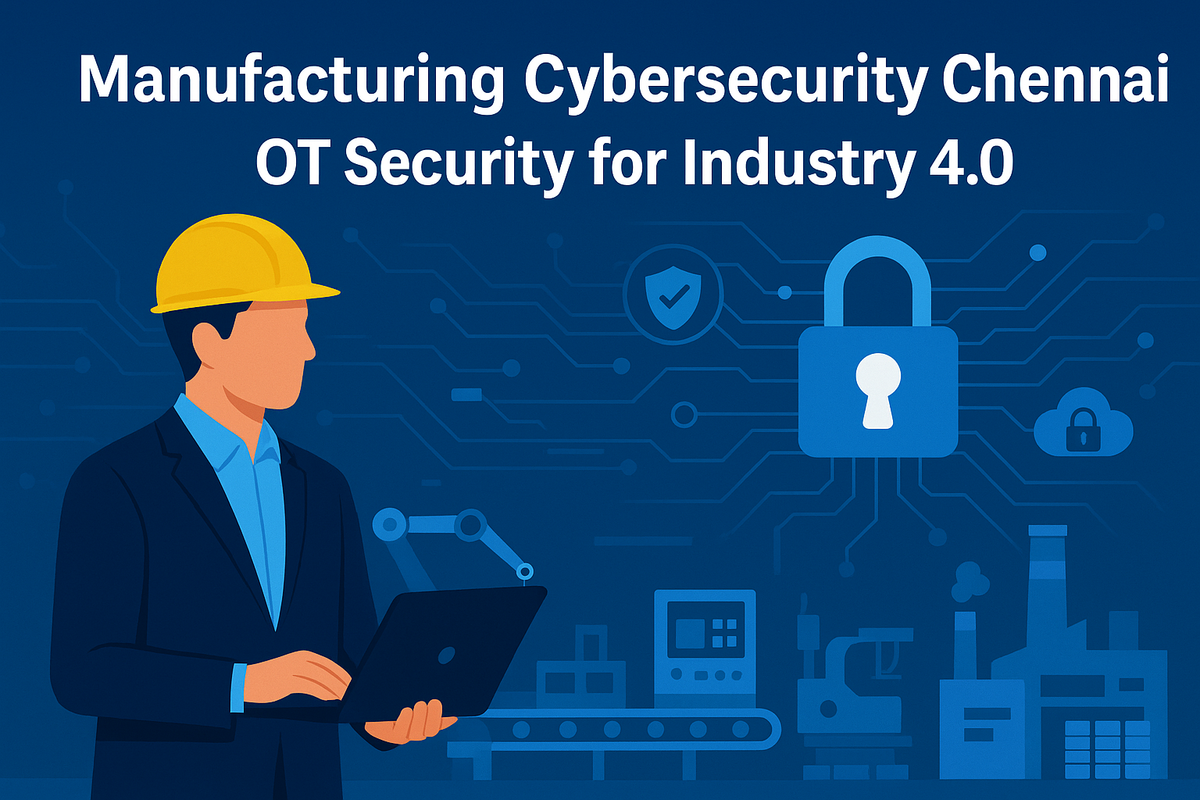Manufacturing Cybersecurity Chennai: OT Security for Industry 4.0

Introduction: The Changing Face of Manufacturing in Chennai
Chennai has established itself as a leading manufacturing and industrial hub in India, hosting sectors like automotive, electronics, and heavy machinery. Industry 4.0 has further fueled this growth, driving technologies such as automation, IoT, and smart factories. However, this rapid digital transformation has exposed manufacturing firms to escalating cyber threats, especially those targeting OT systems, which were traditionally isolated.
Understanding the Cyber Threat Landscape in Manufacturing
Manufacturers in Chennai face a heightened risk of cyberattacks, with 55% of Indian companies reporting multiple breaches in the past year, primarily driven by the convergence of legacy machinery and modern digital systems. Key OT-focused threats include:
- Ransomware attacks crippling production lines.
- Phishing campaigns targeting operational staff.
- DDoS events causing factory downtime.
- Compromising Industrial IoT (IIoT) devices.
- Exposure of SCADA (Supervisory Control And Data Acquisition) systems to the open internet.
The Unique Challenges of OT Security
Unlike IT systems, OT environments in manufacturing are built for reliability and uptime, not security. Integrating modern Industry 4.0 technologies into decades-old infrastructure introduces new risks:
- Outdated operating systems with unpatched vulnerabilities.
- Lack of security controls such as firewalls and segmentation.
- Limited visibility into network activities and asset inventory.
- Challenges in deploying security updates without disrupting operations.
Industry 4.0 in Chennai: Opportunities and Risks
As smart factories proliferate, Chennai’s manufacturers leverage robotics, analytics, and IIoT. These advancements deliver operational efficiencies, predictive maintenance, and supply chain visibility, but also expand the attack surface dramatically. The industrial workforce often lacks OT-specific cybersecurity awareness—a major gap given attackers’ increased focus on social engineering.
Regulatory Landscape and Compliance
India’s government is ramping up cybersecurity regulations for critical infrastructure. Chennai’s manufacturers are bound by:
- CERT-In Guidelines (2022): Mandating incident reporting and regular security audits for OT environments.
- National Cybersecurity Policy (2023): Requiring compliance in sectors like manufacturing, power, and logistics.
- New penalties for non-compliance, including financial losses and brand damage.
Key Cybersecurity Best Practices for Manufacturers
To combat these challenges, Chennai’s manufacturing organizations are adopting several global and local practices:
- Network Segmentation: Separating OT from IT networks to prevent propagation of attacks.
- Zero Trust Architectures: Limiting lateral movement and enforcing strong authentication.
- Regular Security Audits and Gap Assessments: Employing local experts for VAPT (Vulnerability Assessment and Penetration Testing).
- Employee Training: Building staff awareness, especially for OT operators.
- Incident Response Planning: Establishing and rehearsing response playbooks.
Chennai’s Manufacturing Cybersecurity Ecosystem
A host of cybersecurity providers—such as StrongBox IT, CyberNX, IARM, and others—are tailoring solutions for the region’s industrial enterprises. Their services include:
- Custom OT/ICS security audits.
- Threat detection and response.
- Industry-specific compliance consulting.
- Managed security operations for 24/7 protection.
Case Studies: Real-World Cyber Risks for Tamil Nadu Factories
Recent years have seen Tamil Nadu manufacturing giants—especially in automotive, electronics, and aerospace—facing large-scale malware outbreaks, data breaches, and incidents of production-halting ransomware. In 2024, Tamil Nadu alone recorded cyber fraud losses exceeding ₹1,100 crore, underlining the severity of the cyber risk landscape in local industry.
Rising Trends and Future Directions
In 2025 and beyond, Chennai’s manufacturers must prepare for:
- The growth of Ransomware-as-a-Service platforms, making attacks more accessible and devastating.
- AI-powered threats, which can breach defences by mimicking legitimate factory traffic.
- The security implications of 5G network adoption and remote factory operations.
- Increasing reliance on cloud-based OT security services.
Building a Culture of Cyber Resilience
Cybersecurity in Chennai’s manufacturing sector demands a holistic approach. This includes:
- Technological solutions (threat detection, network segmentation, endpoint protection).
- Process strategies (incident response, compliance workflows).
- People-centered initiatives (training, organizational buy-in).
Conclusion
With the convergence of digital transformation and OT-specific threats, manufacturing cybersecurity is no longer a “nice to have”—it is a fundamental pillar for Chennai’s factories to ensure operational continuity, regulatory compliance, and a secure future. Proactive investment, robust partnerships with local security providers, and a workforce trained to prioritize cyber hygiene are critical to thriving in the Industry 4.0 era.
Take the Next Step in Cybersecurity with Codesecure Solutions
Cyber threats are evolving — and so should your defense. With a trusted partner by your side, you can protect your business and focus on what matters: growth and innovation.
At Codesecure Solutions, we deliver comprehensive cybersecurity services in Chennai, including:
- Vulnerability Assessment & Penetration Testing (VAPT)
- Network Security Implementation
- Compliance Support (ISO 27001, PCI-DSS, HIPAA, DPDP Act, GDPR)
- Cloud & Endpoint Security
- Security Awareness Training
Our approach is tailored — whether you’re a startup, SME, or large enterprise, we customize solutions to meet your organization’s unique needs.
Ready to strengthen your security posture?
📞 Call us: +91 73584 63582
✉️ Email: [email protected]
🌐 Web: www.codesecure.in
Stay secure. Stay vigilant. Let Codesecure Solutions guide your cybersecurity journey.
